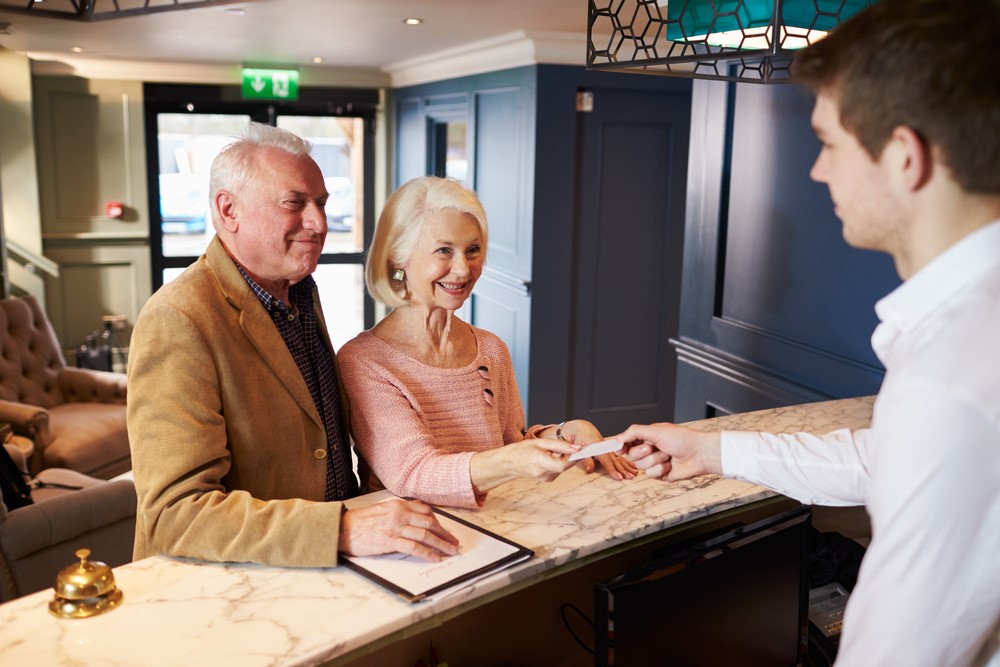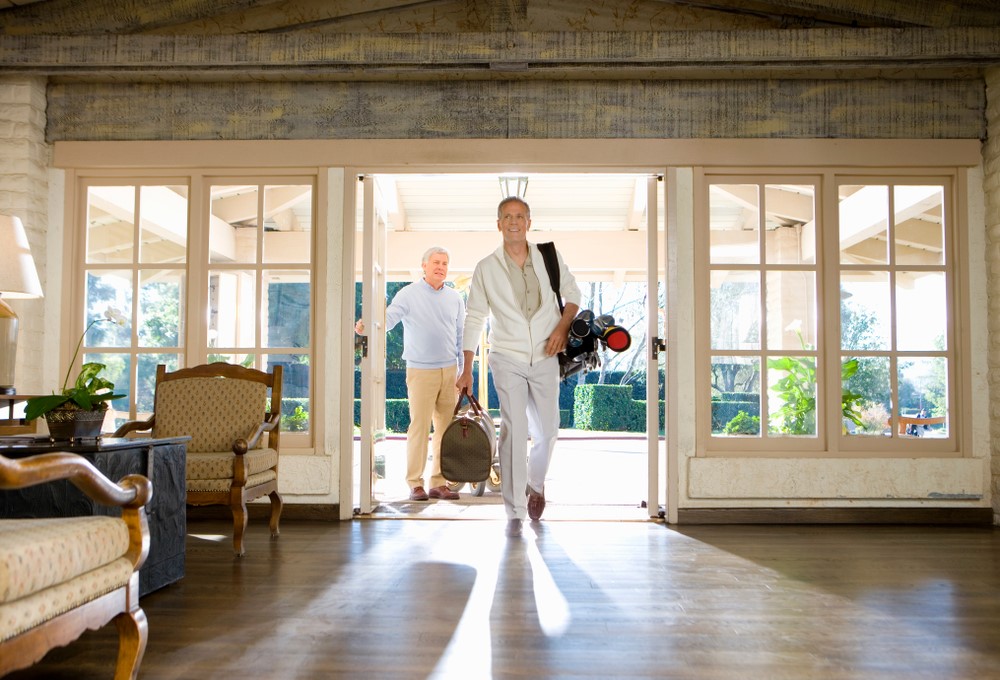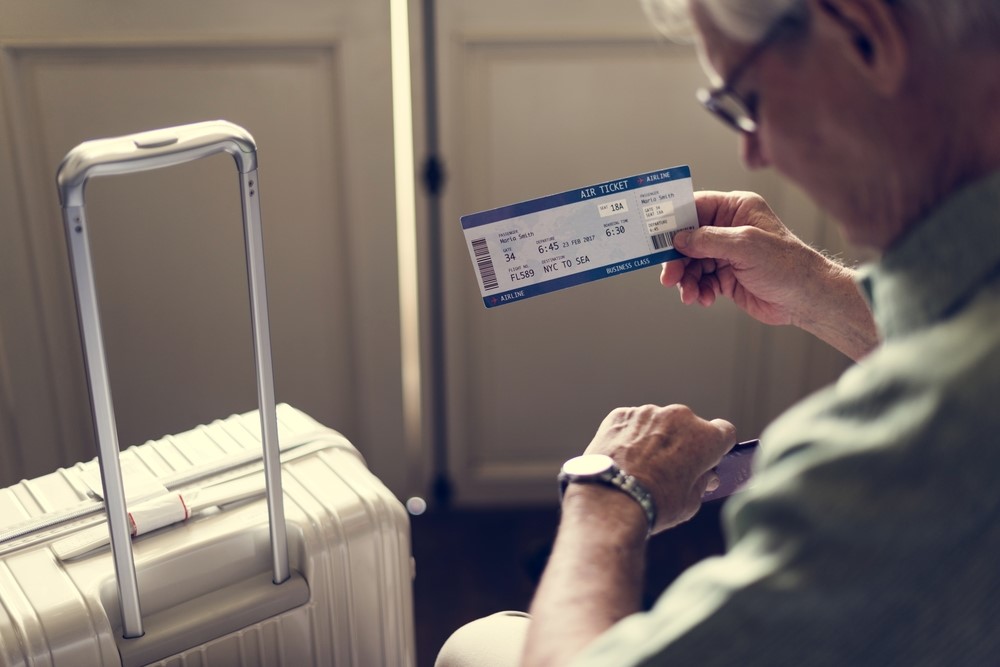
Going on a vacation should be a calming and enjoyable experience. Even in these COVID-19 times, where so much is unknown, it’s still important to find chances to get away and enjoy life. For anyone supporting a family member with dementia, finding dementia friendly hotels is an important way to do so.
Such hotels can make your experience so much easier, while also making things more enjoyable for the dementia patient. If planned well, a vacation with a dementia patient can still be worth the effort.
The key is in the planning.
It’s crucial that you look for places that will work well for everyone involved. This includes having easily accessible rooms, medical support, and a friendly environment. It also helps to get the hotel staff on board, so there are some people there who know what to do if there’s a crisis or if your family member starts to be difficult.
Thankfully, there’s a growing focus on inclusive hotels and making leisure accessible to all, so finding dementia friendly hotels isn’t as difficult as you might think.
In the following sections, we highlight some key areas to think about when planning a vacation for you and your loved one.
Listen To This Post Here:
Plan Your Vacation Carefully
Planning is the first area and it’s an important one. This includes working out where you’re going to stay ahead of time, making sure that everything is booked, and packing well.
Don’t just pack the essentials either. It’s important to think carefully about what might be important.
For example, if your family member has something they use most days, like a game or a blanket that they fidget with, bringing that along might make them feel more comfortable.
It’s also important to have contingency plans. What will you do if the dementia patient won’t settle? If they find the whole experience overwhelming? If the answer is to return home, how will you do so without adding additional stress to the experience? If you purchase non-refundable plan tickets, the expense of changing your flight to leave earlier may be entirely cost prohibitive.
It might help to talk to other family members. They may have advice or ideas that you haven’t thought about.
Stick To Familiar Routines
Spontaneity is often a popular feature of any vacation. Many of us love the idea of waking up and having no commitments, allowing the day to pan out as it does.
That idea doesn’t work well when supporting a person with dementia.
Routine is often a huge part of life for a person with dementia. You’ll want to stabilize them and make sure that they’re not scared or confused throughout your trip. It’s often helpful to continue with familiar routines while you’re away on vacation. This might help them to feel more comfortable and decrease the risk that they feel frightened in a new environment.
My father likes to take his medication with cranberry juice, so we might bring along a bottle of his favorite brand. Like clockwork, he likes to tune into the Price is Right and Let’s Make a Deal. If possible, you can fit in an episode or two.
Keeping to routines should also make the transition back home much less stressful.
Features of Dementia Friendly Hotels

There are some specifically designed dementia friendly hotels, along with other places that may work well for dementia patients, despite not being designed that way.
Some features of dementia friendly hotels include the following:
- Two beds in a single room: A two-bed, one-room arrangement is best for watching out for your cherished one, particularly in the center of the night. Avoid the suite or connecting rooms – regardless of whether it is offered a free upgrade.
- Accessibility: Some hotels specifically feature rooms with a clear access path, extra-wide doors to the hall and bathroom, and grab bars for the toilet for people with dementia. With temperature-control faucets and emergency call buttons in the restrooms, some hotels go above and beyond. Whether these features are in operation, inquire at the time of booking.
- Medical help: Doctors and nurses with dementia experience may be available on standby in emergency cases. Such a need is due to unusual reasons in cases of unintended deterioration of the condition of patients.
- Nurses: Dementia certified external nurses who are working on a need basis.
- Design: Knowledgeable designers and dementia-friendly spaces that would make it easy for guests to navigate their way to their rooms and hospitals for the necessary renovation and signage.
- Tools: There may be tools and support systems in place as well, such as lifts, wheelchairs, medical beds, and the ability to call for assistance.
For an individual with dementia, a smaller hotel without too many corridors might be less overwhelming. It might be a smart idea to book for days other than the busy season since areas are likely to be less crowded, and more time and consideration can be provided to you by employees.
Some dementia-friendly hotels also provide activities, such as support groups, social functions, and health activities for people with dementia. The staff also checks in on the guests with dementia frequently.
Think About Yourself Too
What do you want out of this trip?
Is the time away mostly because you need a break? Is it to give your family member a good experience? Is it a little bit of both? Maybe you’re in town for a family wedding but wanted the privacy of your own space.
Your answer to that question is crucial, as you’ll need to plan to make sure your needs are met.
This is particularly true if you’re hoping for a break.
After all, there’s every chance that a vacation with your loved one is going to be hard work – even if you find good dementia friendly hotels for your stay. It might even be more difficult than being at home, as they are in a new and unfamiliar environment. Being away from their familiar surroundings could trigger anxiety. My own father can’t visit my own sister’s home without pestering my mother every five minutes, asking when they are going to go back home.
Honestly, if you’re looking for a break – it’s better to take a vacation on your own. Or, someone else to take a vacation with the person who has dementia, while you have a rest at home.
If you’re looking for a chance to connect with your family member or want to give them a good experience, then traveling with them could be a good idea. Just, please, be realistic when you’re planning. The more you’re aware of the challenges and plan for them, the better your experience will be.
Consider a Second Set of Hands

If you truly need to unwind yourself on this occasion, it’s worth hiring someone else for the outing who can go about as a co-carer with you (or getting a family member to come along with you). That way, you can have some ideal opportunity for yourself, and there won’t be such a significant amount of weight on you.
Likewise, a person who is independent in a familiar setting may need additional help when dealing with a new environment or changes to their schedule. It may be very helpful to have an extra pair of hands, but it would definitely need to be someone your loved one knows and trusts.
Dementia-friendly hotels often provide you with the option to hire a caregiver. While this might cost you some extra bucks, it is totally worth the money. The caregivers are adequately trained to care for people with dementia and will undoubtedly make your experience more pleasant.
Conclusion
While it can be challenging to travel with people suffering from dementia, it is not entirely impossible to do so. While adequate planning is essential, it is likewise imperative to realize the significance of dementia-friendly hotels.
These hotels provide additional facilities for dementia patients and often offer health and social programs for such people. It ensures an enjoyable experience for people with dementia, as well as their caregivers.
Feeling Overwhelmed?
Check out our Caregiving Consulting service for personalized support and guidance.


You mentioned that Dementia friendly hotels often provide you with an option for a caregiver. Can you tell me what hotels offer this? I am looking for help when my father travels to see us next month.
Unfortunately, few hotels advertise themselves as being dementia friendly and few have specific dementia related services. Instead, you’ll need to look for some of the features we’ve talked about in this article and enquire carefully. You may need to talk to managers to find out what services are available and what will happen if there is a serious issue.
Also, most hotels won’t have medical staff or be licensed to support a dementia patient, so you or a paid caregiver will still need to provide the bulk of the support.